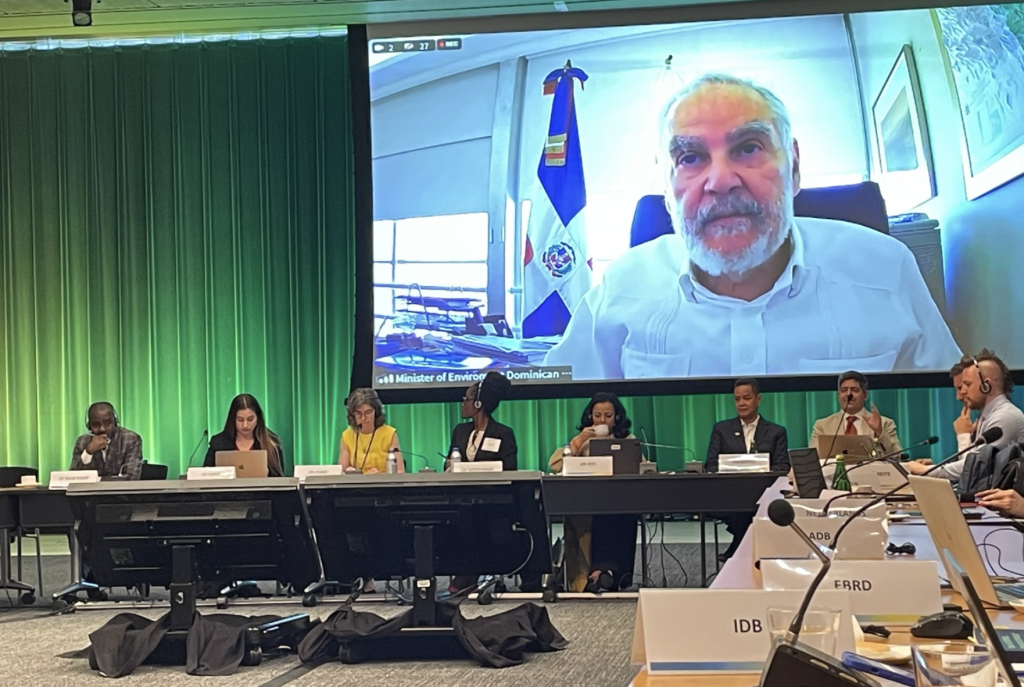
The executive director of the governing board of the Climate Investment Funds (CIF) Tariye Gbadegesin announced on 13 June 2024, Climate Investment Funds for US$30 million are approved for the funding of “from ridge to reef” activities in the Yuna watershed in the Dominican Republic.
Gbadegesin applauded the Dominican Republic’s leadership in climate action. She spoke of high hopes that the Dominican Republic’s project serve as a beacon of hope in the fight against climate change, demonstrating the transformative potential of nature-based solutions and the unwavering commitment to sustainable development. As the project unfolds, it is poised to serve as a replicable model for other nations seeking to harmonize environmental protection with economic growth and social well-being.
Featuring higher than average poverty levels, the watershed that runs through several Dominican provinces faces major adaptation challenges, with extreme weather events such as droughts and floods threatening livelihoods and ecosystems. The plan will tackle policy and regulatory issues, ecosystem restoration and conservation, and nature-positive economic diversification, notably through ecotourism. Co-financing is expected to enhance the impact of the project.
The loan is provided by the Climate Investment Funds through the World Bank and the Inter-American Development Bank, under the CIF’s Nature, People, and Climate Investment Program (NPC). The investment plan been presented by the Ministry of Environment in coordination with the National Council for Climate Change and the Clean Development Mechanism.
The project will be implemented by the Ministry of Environment’s Vice Ministry of Soils and Waters.
The groundbreaking project seeks to restore the Yuna River basin’s capacity to regenerate water, conserve soil and prevent sedimentation, thus guaranteeing food security and increasing agricultural productivity in the important farming area. The program is innovative in that it focuses actions on progressing integrated landscape approaches from upland forest to coastal areas, recognizing the intimate links between various ecosystems.
Environment Minister Miguel Ceara Hatton emphasized the ministry’s commitment to the project’s successful implementation. “We are taking on this responsibility with great dedication,” he stated. “Our technical teams will work closely together to ensure that all strategies and activities are aligned with national sustainability and climate resilience goals.”
Ceara Hatton further highlighted the importance of coordinating sustainable land management and water resource conservation practices with climate change mitigation and adaptation policies. “This ensures efficient and effective project execution,” he explained, “which is crucial for maximizing the impact of the financing and achieving the expected results.”
The project head in the Dominican Republic is René Mateo, Vice Minister of Soils and Waters at the Ministry of Environment.
Echoing Ceara Hatton’s sentiments, Max Puig, executive vice president of the National Council for Climate Change and the Clean Development Mechanism, underscored the significance of climate financing in driving climate action. “As the CIF programs demonstrate,” he remarked, “climate financing must be designed to boost climate action, enhance resilience, and raise national climate ambition.”
The executive vice-president of the National Council for Climate Change and Clear Development Mechanism, Max Puig, noted that CIF programs are conceived to boost climate action, improve resilience and enhance national climate action ambitions.
The project is aligned with the CIF’s Nature, People, and Climate (NPC) investment program that seeks to harness the power of nature-based solutions to address climate change challenges. This innovative approach will integrate sustainable land management practices and water resource conservation with climate mitigation and adaptation strategies, with promises of implementing a holistic and effective approach to environmental protection.
The representative of the InterAmerican Development Bank in the Dominican Republic, Katharina Falkner-Olmedo, highlighted the impacts of climate change in the country and insisted that the focus on sustainable development that is positive for nature will enable the country to improve the socioeconomic conditions for its citizens.
Read more:
Ministry of Environment
CIF
CIF
17 June 2024

